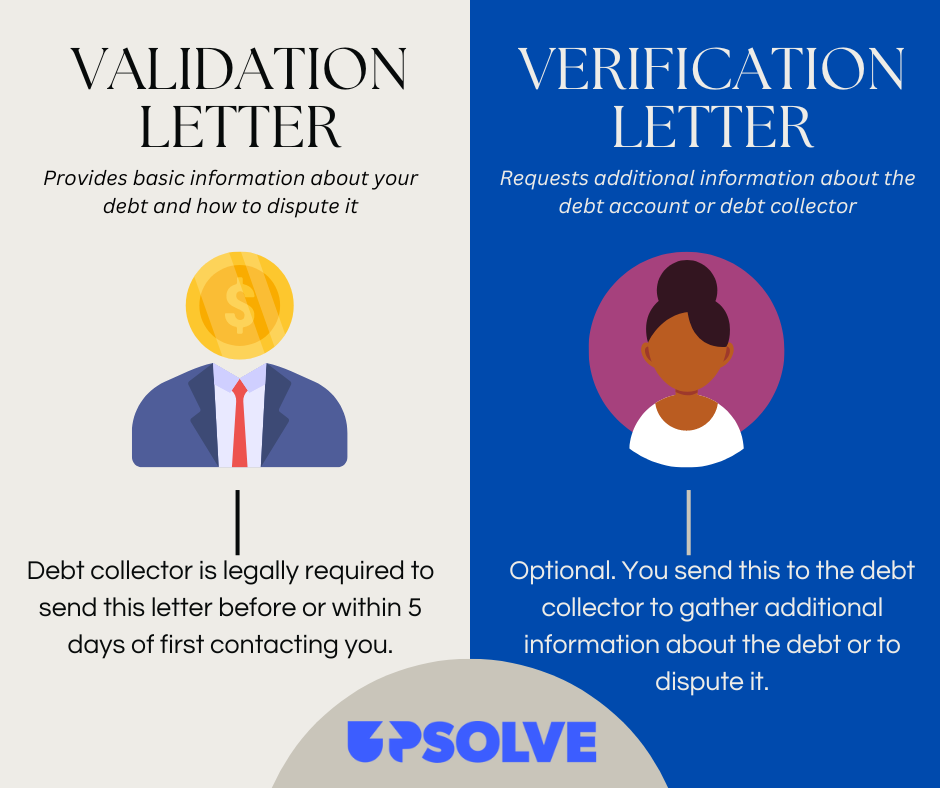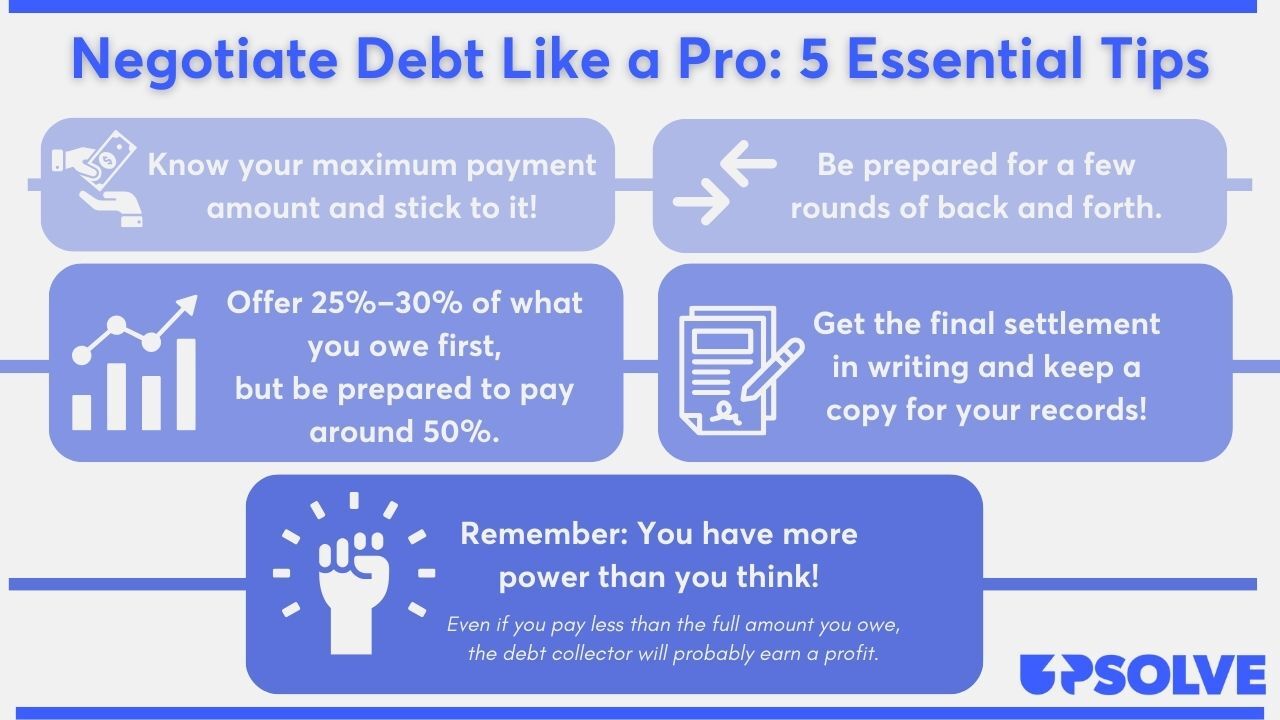How To Win Against Radius Global Solutions
Upsolve is a nonprofit that helps you eliminate your debt with our free bankruptcy filing tool. Think TurboTax for bankruptcy. You could be debt-free in as little as 4 months. Featured in Forbes 4x and funded by institutions like Harvard University — so we’ll never ask you for a credit card. See if you qualify
Radius Global Solutions LLC is a debt collection agency. If they’re contacting you, they probably bought one of your accounts from a creditor and are now attempting to collect the debt. Before you pay, make sure the debt is legitimate. If it is, try to negotiate a debt settlement to pay less than you owe and get the account settled. If you ignore Radius Global Solutions and their collection efforts, they may file a lawsuit against you. If they sue you, respond right away.
Written by the Upsolve Team. Legally reviewed by Jonathan Petts
Updated June 18, 2025
Table of Contents
- Why Is Radius Global Solutions LLC Contacting Me?
- Do I Have To Pay Radius Global Solutions?
- How To Negotiate a Debt Settlement With Radius Global Solutions in 3 Steps
- Can You Still Negotiate a Settlement if There’s a Debt Lawsuit Against You?
- Tips for a Successful Debt Settlement
- How To Beat Radius Global Solutions in a Debt Lawsuit
- Let’s Summarize…
Why Is Radius Global Solutions LLC Contacting Me?
Radius Global Solutions is a third-party debt collection agency. They purchase past-due accounts from creditors like utility companies, telecommunications companies, and healthcare providers. If Radius Global Solutions contacts you, they likely bought a debt of yours from one of your creditors.
Don’t assume all their information is correct. You can ensure the debt is legitimate by asking Radius to validate it. If the debt is valid and you agree you owe it, but you don’t have the money to pay it off, consider negotiating a debt settlement. This allows you to settle the account but pay less than the original amount.
To learn more about Radius Global Solutions and what to do if they contact you, read our article How To Deal With Radius Global Solutions.
Do I Have To Pay Radius Global Solutions?
If Radius Global Solutions can validate the debt and you agree you owe the debt, you will probably have to pay them or you risk some serious consequences. You shouldn't have to pay if Radius Global Solutions can’t validate the debt.
What happens if they validate the debt and you don’t pay? If you ignore a legitimate debt, the debt collector may try to get a court order to freeze your bank account or garnish your wages.
Here’s the good news, though: You may not have to pay the full amount you owe if you work with Radius Global Solutions and negotiate a debt settlement.
How To Negotiate a Debt Settlement With Radius Global Solutions in 3 Steps
Third-party debt collection companies like Radius Global Solutions are a business. Just like any business, they want to make money. Counterintuitively there’s an upside to this for you.
Since debt collectors usually buy debts for way less than the debt is worth, they’re usually open to negotiations. They can still make money even if they settle with you for less than the original amount. In fact, it’s not uncommon for debt collectors to settle for 40%–60% of the original amount.
Sometimes the debt collector will reach out with a settlement offer, but there’s no reason you can’t start that conversation. Once you know the process, you’ll see it’s easier than you might think.
Here’s the three-step process.
Step 1: Make Sure the Debt Is Valid
If Radius Global Solutions hasn’t already sent you a debt validation letter, ask them for one right away. Once you get the letter, read it thoroughly and verify that all the information about your debt account is correct.

If Radius Global Solutions hasn’t sent you a validation letter or you want more information, send them a debt verification letter. These letters help ensure that the debt is yours, that Radius Global Solutions owns it, and that the amount is correct.
According to a Consumer Financial Protection Bureau (CFPB) debt collection rule, third-party debt collectors have to send you a debt validation letter before or within 30 days of contacting you. They also must give you 30 days to dispute the debt.
Step 2: Figure Out What You Can Pay
Once you validate the debt, you need to figure out how much you can pay. You can do this by looking at your monthly take-home pay, expenses, and current debt payments (loans, credit cards, mortgages). This will help you determine how much you can pay a debt collector like Radius Global Solutions.
The CFPB has a helpful budget worksheet to simplify this process. They also have a debt worksheet that helps you organize your bills and see how much money you owe. For extra help, you can get a free consultation with an accredited nonprofit credit counselor. If you’re dealing with multiple debts and aren’t sure which to pay first, a credit counselor can help you create an overall plan and explain your debt-relief options.
Once you determine how much you can pay, figure out how you want to pay Radius Global Solutions: in one lump sum or with a monthly payment plan. Debt collectors typically prefer a lump-sum payment rather than a payment plan. If you have an extra boost in income, like a work bonus or a recent tax return, you could put that toward a lump-sum payment.
Many people don’t have a big chunk of extra money and can’t pay in a lump sum. That’s okay. If a lump-sum payment doesn't work for you, propose a monthly payment plan with a timeline you’re confident in. Some debt collectors may be more open to a payment plan if you set up a direct withdrawal system from your bank account.
Step 3: Make a Settlement Offer to Radius Global Solutions
Once you know how much of the debt you can afford to pay, make Radius Global Solutions an offer. It’s best to make your offer in writing. Request Radius Global Solutions’ reply in writing, too, so there’s a record of the exchange and any agreement you come to.
You can use Upsolve’s Debt Settlement Letter template to get started writing your debt settlement offer letter.
Don’t Just Negotiate the Amount… Negotiate Everything!
You can negotiate more than just the settlement amount! You can also negotiate how you repay your debt and how the collector reports your account to credit bureaus.
After you make a settlement, the debt collector can report the account as paid in full, partial payment, or settled. Having your debt marked “paid in full” is the most beneficial for your credit score. So don’t be afraid to ask them to report your debt as paid in full to help repair your credit score.
Can You Still Negotiate a Settlement if There’s a Debt Lawsuit Against You?
In most cases, even if Radius Global Solutions has sued you, you can still negotiate a debt settlement.
It’s important to continue participating in the lawsuit until your settlement is finalized and the court has dismissed or closed your case. Participating could mean responding to the lawsuit, showing up for appearances, and/or complying with any other court requests.
Tips for a Successful Debt Settlement
Negotiating a debt can feel intimidating, but with a little guidance, you’ll be ready to negotiate like a pro.

For even more tips and info on negotiating, read Upsolve’s article 5 Solid Steps for Negotiating With Debt Collectors
How To Beat Radius Global Solutions in a Debt Lawsuit
If Radius Global Solutions files a lawsuit against you, you will get a summons and a complaint. These official court documents alert you to the lawsuit and outline the case details.
The most important thing you can do if Radius Global Solutions sues you is respond to the lawsuit and follow the court’s instructions. If you ignore the lawsuit, the judge will probably rule in favor of the debt collector and grant an order to garnish your wages or bank account.
Answering a lawsuit may seem overwhelming, but it isn’t as scary as it seems. Here are three steps to follow.
If you're worried about responding on your own, but you can't afford a lawyer, you can draft a answer letter for free or a small fee using our partner SoloSuit. They've helped 234,000 people respond to debt lawsuits, and they have a 100% money-back guarantee.
Step 1: Read the Summons and Complaint Carefully
A summons is a court document that notifies you of a lawsuit. It has important information you’ll need to fill out your answer form, including:
The name and address of the court you report to
Information on all parties involved
The case number assigned to your lawsuit
Legal consequences if you fail to respond to the lawsuit
Summons’ documents vary from court to court, so yours may have more or different information than above. Regardless, the summons should contain the key information you need to know to start filling out your answer form. Be sure to read yours thoroughly.
In most cases, a complaint will accompany your summons form. While the summons informs you of the lawsuit, the complaint outlines the debt collector's claims against you.
Step 2: Fill Out an Answer Form (and Any Other Required Forms)
After you receive a summons and a complaint, you can fill out and file the answer form. Most courts provide blank answer form documents, as well as at least brief instructions on how to fill them out.
To find your court’s answer form, try Googling your court’s name and the phrase “answer form.” You can always ask the court clerk if you don’t understand the form or the process. The clerk is a court official who can provide administrative assistance. They can’t give you legal advice, but they can point you to forms and explain court processes.
The answer form is your opportunity to explain your side of the lawsuit and any defenses you have . To learn more about debt collection lawsuits and examples of common defenses, read: 3 Steps To Take if a Debt Collector Sues You.
One final note: Some courts will require you to submit additional paperwork, like a certificate of service, alongside your answer form. Make sure you know and follow your court’s local rules and procedures. Again, ask the court clerk is you need help understanding or finding the rules.
Step 3: File the Answer Form With the Court and Serve on the Plaintiff
There may be multiple ways to file your answer form. This depends on your court’s procedures. You can almost always file forms in person or via mail. Some courts offer an e-filing option. Ask your court about the filing process if it’s not outlined on the answer form or summon.
Regardless of your court, you will probably have to deliver — usually by mail — a copy of your answer to Radius Global Solutions. This is called “serving” or “service of process,” which is simply a legal term for delivering.
Let’s Summarize…
Radius Global Solutions is a debt collection agency that collects consumer debts for credit card companies, healthcare providers, and utility companies. If Radius Global Solutions is contacting you, they probably bought a debt from one of your creditors.
To ensure the debt is legitimate, you need to validate it before you do anything else. If you owe the debt, figure out how much of it you can pay and try to negotiate a debt settlement. If Radius Global Solutions sues you, take action. Responding to the lawsuit is the best way to protect yourself and your money!
